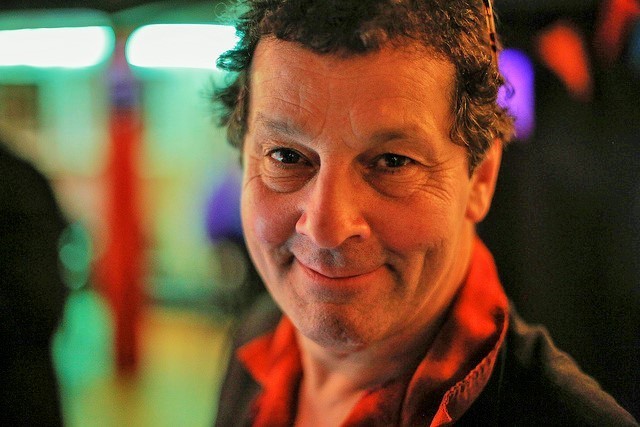‘Amsterdam is so beautiful: rich and poor lived within metres of each other’
 Mike Manicardi, 63, manages Mike’s Badhuis Theatre in Amsterdam’s district of Oost. He arrived in the Netherlands in 1978, has five children here, and remembers how different it was to be a new arrival in those days. ‘Expat is very modern Europe,’ he says. ‘I’m a first generation migrant.’
Mike Manicardi, 63, manages Mike’s Badhuis Theatre in Amsterdam’s district of Oost. He arrived in the Netherlands in 1978, has five children here, and remembers how different it was to be a new arrival in those days. ‘Expat is very modern Europe,’ he says. ‘I’m a first generation migrant.’
How did you end up in the Netherlands?
I was on tour with a theatre company and in that period Holland was the most exciting country in the world, culturally, to work in as a young theatre artist. Back then, the Dutch imported their artists. They picked up people from all over the world. We had different tours, and after one of the last tours, in 1978, I decided to work permanently in Amsterdam.
How do you describe yourself – an expat, lovepat, immigrant, international, etc?
I’m not really happy with these kinds of categories. But my father was Italian and my mother was Irish and as children we constantly travelled in Europe. I studied in England, but we always thought of ourselves as Europeans. The idea of ‘expat’ is very modern Europe. When I came here first we were just foreigners.
How long do you plan to stay and why?
I have been living in Amsterdam since 1978 and I have five children who were all born in Amsterdam. I see Amsterdam as my permanent home.
Do you speak Dutch and how did you learn?
Yes. I learned Dutch on the street. In those days, being an expat was totally different. When you needed a stamp from the Foreign Police the line would stretch down the street from the office. Sometimes they’d take your passport away and tell you to f*** off. The next day you’d have to do the whole thing again. But we loved being outsiders.
What’s your favourite Dutch food and why?
Erwtensoep: that thick pea soup served with brown bread.
How Dutch have you become and why?
I see myself as a first generation migrant. My father was the same. My children laugh at their father’s Anglicisms.
Which three Dutch people (dead or alive) would you most like to meet?
First of all, I’d say Johan Cruijff, for the entertainment. Then Gerrit van der Veen, for his idealism. Van der Veen was an artist, a poet, an educationalist, and a member of the Dutch resistance in World War 2. When he realised the Germans had all the information about Amsterdam’s Jews, he went out and blew up the building where the records were kept. They all got killed, but it was a tremendously brave attempt.
Thirdly, Mathilde Wibaut is not so well known, but she was the wife of Dutch socialist Floor Wibaut, and I admire her intellectual brilliance and social values. She would organise food, events and free education for impoverished kids in Amsterdam, just a hundred metres away from the theatre here. I reckon they’ll make a film about her sometime soon.
What’s your top tourist tip?
Visit the Dutch islands, made famous in the wonderful novel by Erskine Childers, The Riddle of the Sands. The island of Texel is a completely different world, out in the sea. They produce their own milk, cheese, bread and a lovely strong beer. It’s very healthy out there.
Tell us something surprising you’ve found out about the Netherlands.
The proximity of rich and poor in Amsterdam in the small streets. I lived for 20 years in the heart of the Jordaan in an old broken-down hiding place of Gerrit van der Veen in World War 2. Amsterdam is so intricate and beautiful in that rich and poor lived within metres of each other. That is quite unique.
If you had just 24 hours left in the Netherlands, what would you do?
I would go to the island of Texel and drink one of their wonderful beers with my children.
Mike is busy putting the finishing touches to a production of Irish playwright Sean O’Casey’s The Plough and the Stars, marking the centenary of Ireland’s 1916 uprising which takes place later this month. The Shadow of a Gunman will follow in June.
Thank you for donating to DutchNews.nl.
We could not provide the Dutch News service, and keep it free of charge, without the generous support of our readers. Your donations allow us to report on issues you tell us matter, and provide you with a summary of the most important Dutch news each day.
Make a donation